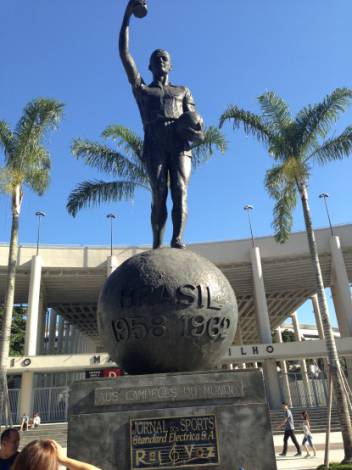BRAZIL. Brazil has been quietly and steadily rising into the global superpower rank, but few people know anything about the largest Latin American country. When asked what Brazil is known for, the overwhelming majority states, “The country that is really good at soccer.” As a result of this mentality and other factors, Brazil was chosen to host the 2014 World Cup. However, despite all the media attention and the abundant tourism that will flock to Rio de Janeiro and the surrounding areas, a majority of Brazilians wish they could back out of hosting the World Cup.
Why wouldn’t a country want to boost their tourism, their international fame and play their beloved sport in their own backyard? The answer lies within the corruptive government that has been in control of Brazil for the last decade. By the end of the World Cup, the Brazilian government will have spent approximately $14.5 billion for construction of these lavish stadiums and hotels, improvement on public transportation systems, and clean up for the favelas. An estimated $3.5 billion was spent on the stadiums alone, with most of these stadiums being used for five games or less. They hope to expel drug trafficking and polish the Rio de Janeiro and São Paulo areas for a safer and more peaceful World Cup. However, this is a façade of daily life in Brazil.
Ana Clara Coehlo, a resident of Rio de Janeiro, stated, “The [World Cup] is cool, but in general, we don’t think that our county is ready for such a thing. We don’t have good hospitals, security or public school education. The government spent the money building and rebuilding stadiums, when truthfully, the money could be well spent in other areas.”
The Brazilian people are tired of their money being spent on these lavish stadiums for visitors while the country’s infrastructure, school systems and hospitals are failing. According to The Organization for Economic Cooperation and Development (OECD), in-patient hospital beds have fallen from 3.3 beds in 1993 to 1.9 beds in 2009. The quality of hospitals are in decline as well, with only 41% of public spending going into the healthcare sector making Brazil heavily reliant on private financing.
Likewise, the Brazilian school system is inadequate compared to many world superpowers. The OECD took a survey in 2009 measuring 15-year-olds’ math and literacy skills in a mass array of countries. Brazil was ranked 53 out of 65 countries behind Turkey and Mexico. With a fumbling school system and an inefficient health care system, Brazilians are raising their voices against the government. As early as last July, the Rio streets were set ablaze with mass protests and a fiery crowd. The government silenced these protestors and the issues have remained unaddressed.
With the government failing to recognize Brazilian concerns, the masses are going to become angrier with their government leading into the 2016 Olympic Games. Fabricio Eric de Carvalho, a resident of São José do Rio Preto in São Paulo, said that despite the tension he will still support the team because “soccer brings happiness to our country.” With the whole world watching Brazil for the next month, the media and the people can certainly make some headlines in relation to the corrupt government and their despairing lifestyles. As a rising world superpower, Brazil is trying to boast a stable government, happy citizens and an improved lifestyle. However, the Brazilian people might not agree with that image. There is a lot of glamor shown on television during the World Cup, but Fabricio Eric de Carvalho highlights just the opposite. “We don’t know how other countries will see Brazil [in the next few weeks], but I can assure you that we are in chaos,” he said.

